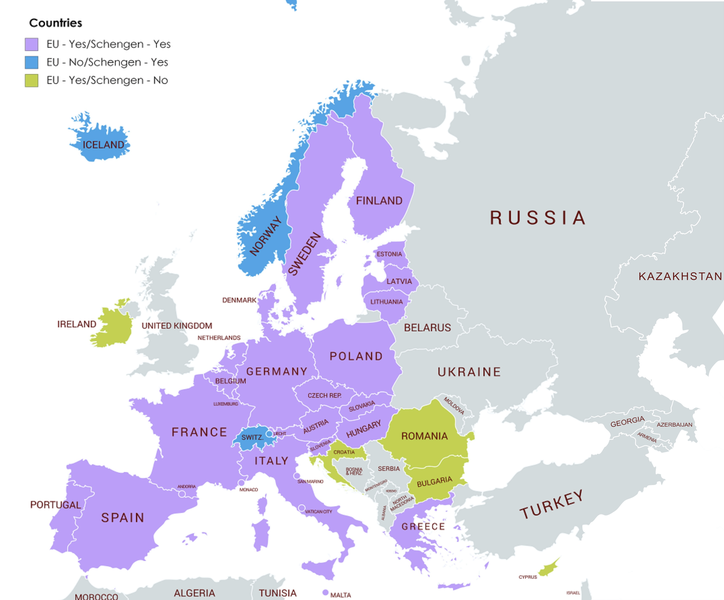

Croatia will become the Schengen zone’s newest member on 1 January, the Council of the EU announced on Thursday, 8 December.
Croatia will “take two important steps in its European integration, by joining both the euro and the Schengen areas”, noted Czech Interior Minister Vit Rakusan, whose country has held the EU rotating presidency for the second half of 2022.
As of January there will be 27 Schengen member countries, as Croatia joins fellow EU member states Austria, Belgium, Czechia, Denmark, Estonia, Finland, France, Germany, Greece, Hungary, Italy, Latvia, Lithuania, Luxembourg, Malta, Netherlands, Poland, Portugal, Slovakia, Slovenia, Spain and Sweden, and non-EU members Liechtenstein, Norway, Iceland and Switzerland.
The Schengen area allows more than 400 million people to travel freely between member countries without border controls and is utilised by some 3.5 million people daily, totalling around 1.25 billion journeys per year.
“My colleagues and I will continue to work hard to ensure that we can welcome Bulgaria and Romania into the Schengen family in the near future,” Rakusan said.
Austria, Netherlands, blackball Romania, Bulgaria
When EU justice and home affairs ministers discussed Schengen expansion, the other two candidates’ applications were blocked, as Austria vetoed Romania and Bulgaria.
The Netherlands has also been openly sceptical of Schengen membership for Bulgaria, which, like Romania, joined the EU six years before Croatia.
The European Commission has already endorsed all three countries for membership. In October, MEPs backed Bulgaria and Romania joining the Schengen zone in the coming months by 547 to 49 against with 43 abstentions. However entry required a unanimous vote from EU member countries.
An EU official speaking on condition of anonymity told Politico that two countries had blocked the entrance, arguing that they were failing to manage a surge of migrants to the EU. “The presidency has tried everything to change positions, in vain”, even noting “a certain bitterness in the room”.
Bulgarian, Romanian premiers react, EU official remains hopeful
After the meeting European Commissioner for Home Affairs Ylva Johansson underlined that Romania and Bulgaria “have fulfilled all the requirements necessary (and) deserve to be part of Schengen”. Johansson expressed confidence that the issue could be overcome before her tenure expires in summer 2024.
Hungarian Foreign Minister Peter Szijjarto confirmed that the two dissenting countries had been Austria and The Netherlands, and wrote that Romania and Bulgaria “have been working hard to protect their borders and have done a lot to rein in illegal migration” and therefore should have been permitted to join Schengen.
On Saturday Bulgaria’s caretaker Prime Minister Galab Donev said “Schengen is not only a national interest, it is also a pan-European interest, because it affects the economic and social rights of European citizens, as well as the security of Europe,” in an interview with television channel bTV.
Romanian President Klaus Iohannis called the development “profoundly unfair for our country and for Romanian citizens” and called Austria’s stance “regrettable and unjustified”.
European press decry Schengen snubs
Some press reactions were equally critical as Iohannis. An opinion piece in The Frankfurter Rundschau called the decisions “downright cynical: Croatia is a holiday destination, and there are huge traffic jams at the borders during the holiday season. The EU wants free travel for tourists, but not for people who are looking for a better life for themselves,” the German daily added.
Bulgarian newspaper 24 Chasa said the decisions had a racial aspect. “All the talk about migrants and corruption is just smoke and mirrors. The truth is that northern Europeans don’t want the Roma. Most Roma in Europe live in Romania and Bulgaria, and the goal is to keep them there, just like the refugees coming to Europe from Asia,” 24 Chasa opined.
Vienna daily Wiener Zeitung questioned the logic of Austria’s stance on south-east Europe, by “gambling away good will in Bulgaria and Romania” over Schengen, while “urging its European partners to finally offer Albania, Bosnia, Kosovo, Montenegro, northern Macedonia and Serbia reasonable prospects of (EU) accession”. French daily Liberation‘s correspondent Brussels meanwhile accused the Austrian and Dutch governments of “pandering to populists”.
Recent Posts
Baltic states ramp up air, missile defences
The Baltic states are stepping up their air, missile and drone defence capabilities, as Estonia,…
Polish bourse WIG index tops 100,000 points in historic first
Poland’s main stock market index, the Warsaw Stock Exchange (WIG), closed above 100,000 points for…
Polish PM declares national strategy to lead CEE, as nation celebrates 1,000th anniversary
Poland has launched a new national doctrine aimed at establishing the country as the dominant…
Prague expands airport, revamps tram service
Prague has launched two major transport infrastructure projects, expanding Vaclav Havel Airport and introducing a…
Poland tops employment rankings – OECD report
The EU’s employment rate reached a record high of 70.9% in the fourth quarter of…
Greece plans to repay Eurozone’s bailout loans whole decade in advance
Greece has announced plans to repay its first bailout loans a decade ahead of schedule,…


